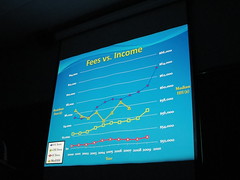 Every organization has politics. Every business has a power base and a structure. And every organization has internal and external barriers that need to be straddled, worked-around or overcome. This often means that success comes not from following the rules but from delivering outcomes. And this also means that success also comes with inherent failure – after all, governance processes are in place for good and valid reasons.
Every organization has politics. Every business has a power base and a structure. And every organization has internal and external barriers that need to be straddled, worked-around or overcome. This often means that success comes not from following the rules but from delivering outcomes. And this also means that success also comes with inherent failure – after all, governance processes are in place for good and valid reasons.
But as we reach the last quarter of the year, leaders will be turning their attention to closing what business they can before the year end, as well as planning for the new year ahead. With the economy remaining tight, we may be tempted to focus only on the short term – securing business, bringing in every last dollar of revenue and squeezing out extraneous costs – leaving the 2010 plan open ended or only half-baked. If you find yourself in this situation, you may want to consider what I call “Do-able Strategy”.
- Direct business engagement – work with your leadership team to identify and prioritize the new business opportunities in your sales pipeline. Determine where best you can inject yourself into the process with a view to closing the deal – or get out of the way and let your team do its job.
- Objectives – scan your opportunity pipeline for the emerging “need states” of your top customers. Are there new issues or business problems appearing on your customer’s horizons? Use these to begin feeding your 2010 strategic objectives. Make sure that these are folded back into any customer discussions that are taking place during the last quarter.
- Authority and responsibility – Now it is time to invest your team with what Wally Bock calls authority and responsibility. Make them responsible for achieving outcomes and then ensure they have the authority to make it happen (remember the do-able strategy is as much about doing as it is about strategy).
- Breakdown – as all the elements of your near and short term plans begin to take shape, it can become overwhelming. Remember to breakdown your strategy into executable programs. Ensure that there is someone responsible for each program.
- Learn – we can always learn from a process. Make sure that your learnings are being recycled into your forward planning. Don’t repeat the same mistakes. The goal is to become a scholar-practitioner.
- Engage the emotions – many leaders tiptoe around emotions. They see them as the messy side-effect of dealing with people. But emotions can supercharge your team. Rather than avoiding emotions, engage them. Talk to your team about your vision. Work to include them in operationalizing it. As Steve Roesler reminds us, “emotions prompt us to act”.
Nina Nets It Out: Sometimes circumstances conspire against our best strategic efforts. Rather than sacrificing longer term planning for short term gain, consider accelerating your planning process. It’s not a substitute for a formal, rigorous plan, but it can alleviate the pressure in the short term.
Thanks for your suggestion and thought, i will use that strategies and grab that all.